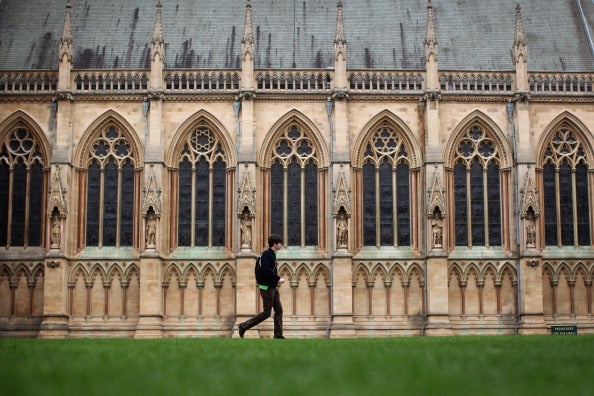Women students are facing academic barriers at Cambridge University, says new gender inequality report
Women's officer says women students have been let down, institutionally and academically, by the university 'for too long'

Your support helps us to tell the story
From reproductive rights to climate change to Big Tech, The Independent is on the ground when the story is developing. Whether it's investigating the financials of Elon Musk's pro-Trump PAC or producing our latest documentary, 'The A Word', which shines a light on the American women fighting for reproductive rights, we know how important it is to parse out the facts from the messaging.
At such a critical moment in US history, we need reporters on the ground. Your donation allows us to keep sending journalists to speak to both sides of the story.
The Independent is trusted by Americans across the entire political spectrum. And unlike many other quality news outlets, we choose not to lock Americans out of our reporting and analysis with paywalls. We believe quality journalism should be available to everyone, paid for by those who can afford it.
Your support makes all the difference.The extent of gender inequality at the University of Cambridge has been revealed in a survey by the institution’s student union.
Entitled Mind the Gap, 2014/15 women’s officer Amelia Horgan said that, throughout the British education system, women tend to do better than men – except at the Universities of Oxford and Cambridge.
Having surveyed over 1,400 respondents – including 397 men and 961 women – the findings have highlighted how one in five women feel their gender has an impact on their exam results, compared with one in 20 men.
Another key finding shows how 70 per cent of women do not feel confident doing their exams. The figure for men sat at 40 per cent.
Women are also twice as more likely to request exam adjustments than men, the results said.
The report also outlines how:
49 per cent of women feel their mental health problems are ignored and therefore negatively impact their work; only one-third of men felt that way
Around 1 in 5 women felt their gender negatively impacted their learning experience compared to 1 in 25 men
Women students are twice as likely to feel they struggle with learning new ideas as men
One in three women do not feel Cambridge provides an environment that allows them to work to the best of their ability
Black and minority ethnic women are less likely to feel they are in a supportive learning environment than white women
The results conclude that women students at the institution were significantly less likely than men to obtain a First at the end of their undergraduate degree than men.
One student even described how she changed her entire writing style in order to get noticed and said: “I sat down and told myself ‘to write like a boy’. The essay I wrote was not in my usual style – very confident with less subtleties and details. Less ‘balanced’. I felt arrogant, even.
“My supervisor told me it was one of my best essays. I did the same next week, with the same result.”
Another undergraduate described her fear of approaching supervisors and explained: “Often, my supervisors [who are mostly male] will engage in ‘banter’ with male students, but maintain their distance with me and other female students.
“This makes me feel less confident in supervisions and I won’t answer questions unless I am sure I am right for fear of being humiliated.”
Hoping the report’s findings will help to change the situation, Ms Horgan said: “Many women at Cambridge report feelings of isolation, misery, and frustration but – most of all – a desire to change the university in ways that would benefit all its members.”
One male student, who spoke anonymously with the student newspaper, The Cambridge Student, called the report “embarrassing” and added: “It’s shameful that Cambridge in the 21st century still hasn’t been able to deal with this.”
The women’s officer for 2015/16, Charlie Chorley, explained how women have been let down, institutionally and academically, by the university for too long and added: “This survey needs to be recognised as the first step in addressing the systematic barriers to equal opportunities of success, and must be taken seriously by the university. Everyone deserves to thrive here.”
A university spokesman highlighted how the report fails to take account of the significant work already being done by the university, and its plans for the future.
He said: “Research conducted by the university has shown that female and male students at Cambridge are equally likely to obtain a good degree – but men have a higher chance of being awarded a First than women in some academic disciplines.
“However, men also have a significantly higher chance of being awarded a Third than women in some academic disciplines.”
He added the university is already conducting a thorough review of its examination assessment processes, and that the question of gender attainment is specifically being considered.
“CUSU’s report will be considered at the next meeting of the Equality and Diversity in Education sub-committee. CUSU’s women’s officer is a member of this committee.”
The spokesman added how the sub-committee will be continuing its significant work on gender attainment in exams and will continue to work closely with faculties and departments.
Join our commenting forum
Join thought-provoking conversations, follow other Independent readers and see their replies
Comments